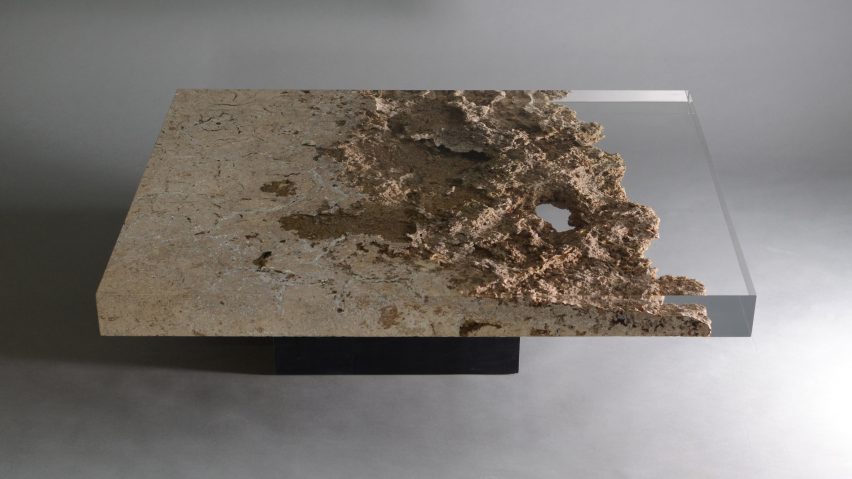Italian design studio Alcarol has teamed up with Tuscan stone company Vaselli to create a table and stools made from eroded Travertine encased in resin.
Presented at BSPK, a furniture gallery curated by Nicola Gallizia, during Milan design week, the table and stools are made from Rapolano Travertine – a type of sedimentary rock which has been quarried near Siena, in Tuscany, for centuries.
Alcarol and Vaselli took blocks of the eroded travertine stone and cast them in transparent resin. The resin, which strengthens and preserves the stone's cavities, is then polished to create perfectly angled blocks and slabs.
Fixed on a burnished steel base, a slab of Travertine that fades into clear resin forms a low table, while the blocks of stone and resin are cut into perfect cuboids to create the stools.
The designers said that clear resin was chosen as it resembles the water in which these rocks lay submerged through various eras.
Travertine, which can be white, tan, cream coloured, and even rusty is a terrestrial sedimentary rock with a crystalline-texture. It is composed of calcite, which is a form of a limestone deposited by hot mineral springs.
For centuries it has been quarried in the Italian town of Rapolano, which is known for its hot springs in which the Romans used to take thermal baths.
The rock is formed by the precipitation of carbonate minerals, often at the mouth of a hot spring or in a limestone cave, and its porosity is due to the presence of organisms such as macrophytes, bryophytes and algae.
It has been used as a building material since the time of the Etruscans around 800 BC.
The travertine pieces are the latest in a long series of resin furniture made by the Italian design studio based on the same concept.
The studio's founders, Andrea Forti and Eleonora Dal Farra, have previously cast a variety of natural materials in resin to make furniture, including timber poles dredged up from Venice's canal, decaying Bricola wood planks riddled with ship worm, and worktops taken out of Italian quarries and marble processing labs.

